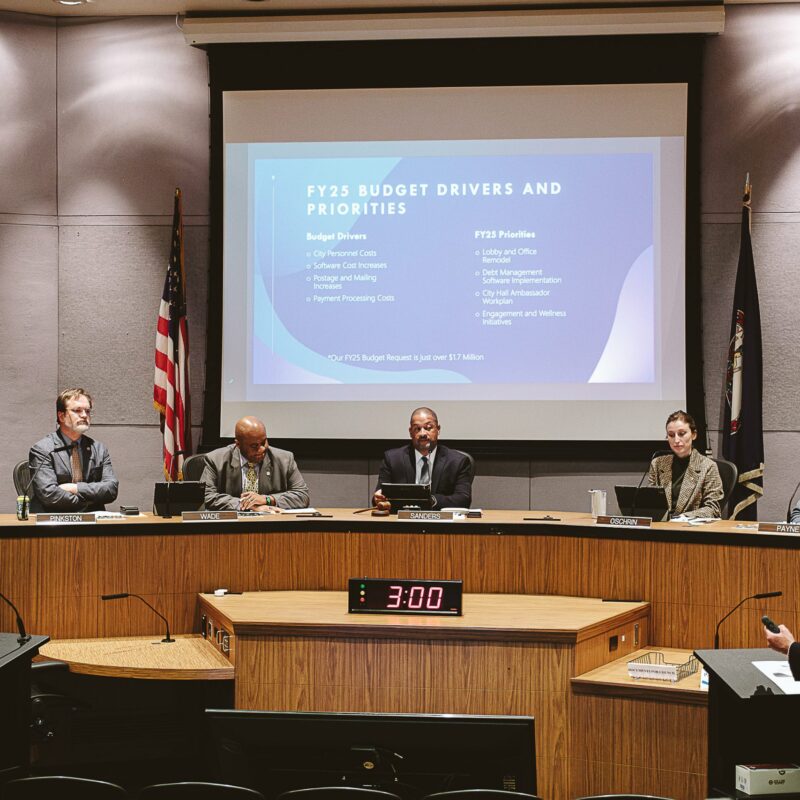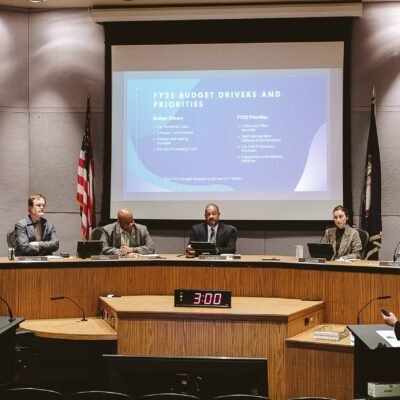If you’re looking for a living example of the kind of extreme religious rhetoric, uttered in the name of policy-making, that would make the Founding Fathers cringe, you need look no further than Virginia’s own Bob Marshall. The 13th District (Prince William County) conservative delegate, who is the state’s leading voice in the war against legal abortion, made national headlines in February for a statement that he claimed came straight out of the Bible.
“The number of children that are born subsequent to a first abortion with handicaps has increased dramatically. Why? Because when you abort your first born of any, nature takes his vengeance on the subsequent children. In the Old Testament, the first born of every being, animal and man, was dedicated to the Lord. There is a special punishment, Christians would suggest,” he said in an attempt to urge Governor Bob McDonnell to cut state support for Planned Parenthood.
Marshall’s outrageous statement was supposedly based on Exodus 13, which states: “The first offspring of every womb among the Israelites belongs to me, whether man or animal.”
MSNBC’s Rachel Maddow corrected the delegate on her show and questioned whether such inflammatory comments are appropriate for an elected official.
Contacted by the show’s producers, Marshall not only stood by his comments, he added, “Christ is referred to as the first born, and he was taken to the temple and dedicated.”
Since then, more than 3,000 people have dedicated their signatures to the petition “Bob Marshall-Resign Now.” Pressure was such that even Governor McDonnell, an acolyte of Pat Robertson, called the delegate’s words “wrong” and “offensive.” Marshall later apologized.
Politicians like Marshall are a lightning rod in the debate about whether religion belongs in politics. But extreme rhetoric like his can mask the fact that many more moderate elected officials are guided by personal religious beliefs. In fact, locally, a healthy segment of City Councilors and County Supervisors acknowledge that Scripture, or at least spiritual values, influence the way they do their job.
“I am a Christian,” says City Councilor Kristin Szakos. Right out of college, Szakos worked for the Catholic Worker Movement and considered becoming a nun. “I guess that to me has informed a lot of things,” she says. “My own personal philosophy of God is that God is infinite and we are so finite and can’t possibly really understand God.”
•
|
DIVINE STATE
“I think it’s very important for communities to have discussions about their values and the immediate issue that I continually raise on the board is ‘what is the core service?’” Ann Mallek, chair of the Albemarle County Board of Supervisors
“I’ve been a Christian since I was the age of 12. I believe everything that I’ve learned at church, learned at home, learned at school, all of that comes to influence and inform a decision.” Alvin Edwards, former mayor of the City of Charlottesville
“I don’t consult any kind of religious texts when I am trying to make a public policy decision. I think you can be an atheist and have a strong moral compass.” Dave Norris, mayor of the City of Charlottesville
“I think a country that is run by people who are devoid of a relationship or understanding of God is a kind of country that is destined to doom.” Rob Schilling, former City Councilor
“I am a Christian. I go to church every Sunday. I have all my life since I was 5 years old.” Rodney Thomas, County Board Supervisor
“I think to be able to use our own religious beliefs as a moral compass for making decisions in the public arena is certainly why we have faith, why we have beliefs.” Kristin Szakos, City Councilor
“I am not ashamed of the fact that I go to church. It’s not a secret that my husband is a pastor. I’m a wife, I’m a mother, I have four kids, and my husband is a pastor. It’s the total package and it may be different for somebody else campaigning.” Holly Edwards, City Councilor
|
Radio host Rob Schilling says that when he was a City Councilor, God was with him. “God is the most important thing in my life,” he says. “And so, everything that I look at is filtered through my faith before it goes anywhere else, at least that’s the ideal, so it was a very large part of my decision-making process.”
Dr. Alvin Edwards, pastor of Mount Zion First African Baptist Church, served as Charlottesville mayor from 1990 to 1992. While he says that he did not particularly base his decisions on his personal faith, he says that because of his role, the connection was intrinsic.
“I don’t think you can put your faith on and take it off easily, although I hear people talk frequently about separation of church and state,” he says.
“You can’t be a Christian when you are in Congress or on the Council and not be one when you’re off the Council. It has to go with you. It travels with you 24/7.”
As for his decisions on Council, Edwards says it was difficult. “I have to really wrestle with it.”
So, as long as he’s not extreme or doesn’t get Rachel Maddow on his case, is it O.K. for a politician to be guided by God?
Some say no way.
Sam Harris, who won the PEN Award for Nonfiction in 2005 and is author of The End of Faith and Letter to a Christian Nation, argues that the American experience is threatened by religious extremism. He contends that religious dogmas are dangerous for the advancement of society. He told NPR that the “fantasies of a world to come” are scientifically unproven. Yet, “on the subject of religious belief, we relax standards of reasonableness and evidence that we rely on in every other area of our lives. We relax so totally that people believe the most ludicrous propositions, and are willing to organize their lives around them,” he told Beliefnet.com. “Propositions like ‘Jesus is going to come back in the next [50] years and rectify every problem that human beings create’—or, in the Muslim world, ‘death in the right circumstances leads directly to Paradise.’ These beliefs are not very contaminated with good evidence.”
Moreover, Harris considers the Old Testament “barbaric,” and agues that “the Qur’an pales in comparison.”
Harris is joined by Vanity Fair atheist Christopher Hitchens, author of God is not Great, who says, point-blank, “Religion is man-made.”
“There are four irreducible objections to religious faith: that it wholly misrepresents the origins of man and the cosmos, that because of this original error it manages to combine the maximum of servility with the maximum of solipsism, that it is both the result and the cause of dangerous sexual repression, and that it is ultimately grounded on wish-thinking,” he writes.
But even some believers doubt that religion belongs in the realm of political discourse. Locally, Albemarle County Supervisor Rodney Thomas told C-VILLE, “I am a Christian. I go to church every Sunday. I have all my life since I was 5 years old,” he says. About religion entering into his political life, he says, “it’s not a religious matter.” And though Supervisor Duane Snow declined to be interviewed, he did say that politics and religion have nothing in common.
•
Schilling invokes a Founding Father to make the case that religion belongs in politics.
“I think it’s very important for people who are in leadership positions to have faith,” he says, referring to a quote by John Adams about the country and the Constitution not being able to survive without a moral citizenry. “I would love to have more people who believe in God elected to office. I think that a country that is run by people who are devoid of a relationship or understanding of God is a kind of country that is destined to doom,” Schilling says. “It’s not that we need religious leadership, but instead, we have God-fearing people in positions of power.”
Schilling sees one political party more closely aligned with this ideal. “God does not have any political party, but if you look at the platform of the two parties, I think one, you will see, is much more aligned with faith perspective than the other,” he says.
For Democratic Councilor Holly Edwards, whose husband is Dr. Alvin Edwards’ brother and is also a pastor, the best life lesson she has learned from being a nurse is how to distinguish between the spiritual and the religious.
“When I struggle with decisions … it helps to separate ‘it’s not about me, it’s about the greater good,’” she says. “And that’s how Jesus went to the cross. It wasn’t about him, it was about how he was going to save humanity and if he was going to do that and risk his life, then I should have the same spirit of sacrifice.”
In a 2008 PEW study, 52 percent of those surveyed said that churches and religious organizations should keep out of politics, an 8 percent jump from 2004. Yet, when analyzing strictly along party lines in 2004, only 30 percent of conservatives said the church should stay out of politics. That number was 62 percent for liberals. Four years later, the numbers were closer: 57 percent of liberals and 50 percent of conservatives held that view.
•
While not every local politician that C-VILLE contacted returned calls to discuss politics and religion, some who did made a distinction between “moral values” and religion.
Take Supervisor Ann Mallek, for example. “I think the way people are raised and the character they develop definitely affects the way they think, based upon the values of their family. And the golden rule was certainly part of my upbringing,” she says.
Mallek was raised Lutheran. “There is a basic tenet of treating others the way that you would like to be treated—and that is a really core value,” she says.
Councilor Satyendra Huja says that while he would prefer to have religion and politics separate, personal values do inform people’s actions. “For example, truth is very important. Being truthful is almost like godliness, and having truth in your behavior is crucial. In that sense it informs the values,” he says.
And some argue that the fundamental teaching of the church is compassion and finding ways to make the world a better place.
“The choices give us the opportunity to do the work of God not in any cosmic way, but in just the way that we are called to live out faith and to do further good in the world,” says Councilor Szakos. “When I look at political decisions, ways that I can be effective in the world, my first impulse is always going to be how to subtract the least powerful and how this is a moral decision,” she says.
Looking at the equation from the church’s point of view, Jim Baker, pastor at Westminster Presbyterian Church on Rugby Road, says the church ought to be concerned about hunger, for example, and if the government seems to not be acting on behalf of those in need, “there may be some political solutions to that.” As a second example, Baker talks health care. “I really think that if churches have not considered the grave facts of how health care is leaving millions who are left uninsured, there is something very, very wrong with that,” he says.
Baker goes on to say that if the church can’t engage in the political discourse to change the status quo (if it needs changing) the church, then, would not be fulfilling its social responsibility. Ultimately, he says, “the call of the church, painting it in broad strokes, is to be concerned about those people who will be without any kind of advocate in society.”
Rev. Jim Richardson of St. Paul’s Memorial Church, believes that although, as an institution, the church should be separate from government affairs, people’s actions, whether religiously or morally based, cannot be separated from their beliefs.
“We all operate off of our own values. That’s not the separation of church and state no more than there can be a separation of values and state. We elect people to government presumably because we like their values, and the voters have the right to elect voters for any reason the voters wish,” he says. “That’s what democracy is about.”
For Mayor Dave Norris, there isn’t a direct connection between the political realm and religion. “I think my personal belief system certainly affects my outlook on the world,” he says. “I don’t consult any religious authorities when I make any kind of public policy decision, but I think we’re all shaped by influences.”
Sometimes, however, religion is a let down.
“We’ve seen time and time again where religious leaders have fallen short of expectations of moral people, so you would hope that somebody with a good foundation in religion or faith would have a good moral grounding, but that’s not necessarily always the case,” he says. See, for example, Mark Sanford and his Argentina escapades, Tom DeLay’s alleged fraud or former Congressman Eric Massa’s groping incident. The list goes on. “Some of the most morally challenged people I know often happen to be some of the most religious people I know,” says Norris.
The debate boils down to whether the church has the right to entangle the body politic and vice versa. Some would say that the church has already ramped up its political power.
Rev. Barry Lynn, executive director of the national Americans United for Separation of Church and State, argues that the “faith-based initiative” created by President George W. Bush and advanced by President Barack Obama, is too great a step in the wrong direction. Lynn says that by insinuating religion into Washington, the church compromises its integrity: “I don’t expect government to help me with my faith,” or run religion for its citizens. A self-named religious secularist, Lynn wants the government to go back to being the sole force behind public policy and the governance of the country.
For Rev. Richardson, America’s beginnings were not about religious freedom, but rather the freedom to express piety and religious fervor. The important political movements were drenched in religious notions and beliefs. “The great awakening of the early 19th century had a huge motivation over ending slavery and there never would have been an abolition movement leading to the civil war without this huge religious great awakening enthusiasm. This realization that slavery was an evil against God—it wasn’t just a political movement, it was a religious movement,” he says. “You cannot separate the religious motivation springing forward into the 20th century. The civil rights movement: That’s a religious movement, that’s not a secular movement.”
|
Reverend Jim Richardson of St. Paul’s Memorial Church spent 20 years in the California legislature, working as a political reporter and the Chaplain of the state senate. For Richardson, separating values from actions is impossible. “People need to come to faith in an honest, genuine, personal way that works for them.” |
Likewise, Greg Thompson, senior pastor at Trinity Presbyterian Church, argues that the church has a responsibility to make moral arguments. “I think that the white southern church ought to have been able to do what the black southern church did in the 1950s and 1960s and oppose certain political candidates with certain political policies that were creating unjust conditions for their neighbors,” he says. “I think the failure of the white church in that is one of our great national shames, and I think the success of the black church in that is one of our great triumphs.”
In the end, John Whitehead, a Christian who leads the Rutherford Institute, a civil rights advocacy group, says, “faith is important. People have the right under the First Amendment to hold a particular viewpoint. They have the right to express it in public. The people who wrote the Constitution were people of faith.”
In terms of what the church could or could not do, Whitehead says the church has the right to speak out if the government is doing something wrong. “It has nothing to do with separation of church and state at that point. It’s really church against the state, and I think it’s really healthy,” he says.
“The principle that we try to teach here when we work with a lot of UVA students is maximum freedom,” says Whitehead. “You’ll get a better result; you’ll know more about what people believe and think, and you’ll be a better informed citizen as a result. You’ll make a better, informed choice. And religion should not disqualify people from running for office. They have a right to hold extreme views, but you would hope that the American citizenry, the people voting, would be able to distinguish and not vote them in. But I’m not sure that’s true.”













